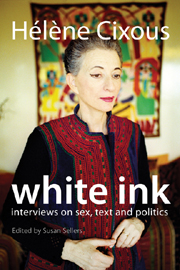Book contents
- Frontmatter
- Contents
- Acknowledgements
- Editor's note
- Preface: On being interviewed
- Part I Writing the enigma
- Part II Writing the feminine
- Part III Writing and politics
- 7 Guardian of language
- 8 Against the emotion of history
- Part IV Writing and theatre
- Part V Writing roots
- Part VI On painting, music and nature
- Part VII Dialogues
- Envoi: But the Earth still turns, and not as badly as all that
- Bibliography of Hélène Cixous's works
- Index
7 - Guardian of language
from Part III - Writing and politics
- Frontmatter
- Contents
- Acknowledgements
- Editor's note
- Preface: On being interviewed
- Part I Writing the enigma
- Part II Writing the feminine
- Part III Writing and politics
- 7 Guardian of language
- 8 Against the emotion of history
- Part IV Writing and theatre
- Part V Writing roots
- Part VI On painting, music and nature
- Part VII Dialogues
- Envoi: But the Earth still turns, and not as badly as all that
- Bibliography of Hélène Cixous's works
- Index
Summary
This interview was published in Women's Education des femmes (Canadian Congress for Learning Opportunities for Women) 12(4) (Winter), 8–10, 1996. It was preceded by a brief introduction to Cixous's work and an extract from the interview in the original French, both of which have been omitted here. All notes have been added by the editor.
ko'g In the 1970s, through both fiction and theory, you constructed a Derridean inspired concept of écriture féminine. Texts like La Jeune Née with Catherine Clément and “Le Rire de la Méduse” develop a theory of writing based on the libidinal economy of the feminine and call for a re-examination of bisexuality. The subsequent “Extreme Fidelity” continued to augment and clarify this concept by locating sexual difference within a cultural domain. How does this theory inspire your own philosophico-poetic texts? Does it provide an ethical and political framework in addition to its aesthetic dimensions?
cixous For me, theory does not come before, to inspire, it does not precede, does not dictate, but rather it is a consequence of my text, which is at its origin philosophico-poetical, and it is a consequence in the form of compromise or urgent necessity.
- Type
- Chapter
- Information
- White InkInterviews on Sex, Text and Politics, pp. 81 - 87Publisher: Acumen PublishingPrint publication year: 2008



